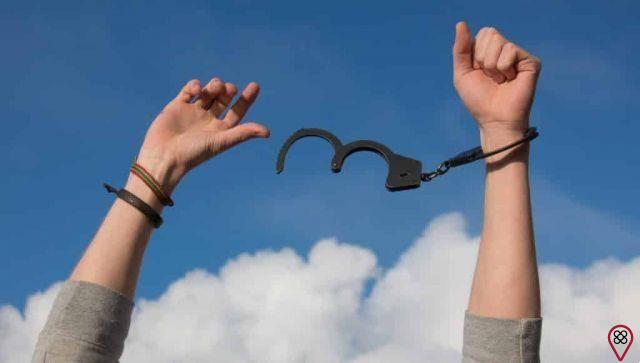Having a good relationship with other people is essential for us to feel good, however we are not always able to build positive bonds for ourselves. This is how abusive relationships develop, which can arise in any area of our lives.
In addition to a relationship or marriage that can prove toxic, relationships with friends and family can also harm us. The main characteristic of this type of relationship is that it makes us feel bad about ourselves because of the other person's attitudes.
If you believe you are going through this experience, the content we have prepared will help you. Here are the signs of an abusive friendship, so that you can get rid of this type of relationship as soon as possible, if that's the case.
How to spot an abusive friendship
There are some signs that help us identify an abusive friendship. Some are more subtle and need special attention. Watch out for the five signs that this friendship isn't doing you any good:

1 – Attempt to control what you do
A friendship needs understanding and respect to work. Understanding that even friends act differently in each situation and respecting those differences must work together.
If the person who is your friend is always trying to control your attitudes, your other friendships or what you do with your life, it is likely that they are abusive, after all they can advise you, but they should not expect you to act as they would.
2 – Criticism about who you are
You know a person is your real friend when they point out your mistakes, when they happen, and help you to be someone better, however there is a limit between constructive criticism and humiliation.
If the comments that this individual makes never take into account your feelings, your freedom or your essence, be careful. In this case, chances are you are experiencing frequent minor humiliations and are not receiving the warm and sincere help you should be.
3 – Envy of your achievements
In a friendship, it is common for people to share achievements and defeats. They celebrate and suffer together, always supporting and strengthening each other, so if the person who is your friend doesn't care about your sorrows and envy your victories, something is wrong.

Realize how this friendship deals with your personal growth. Does this individual really feel happy for you or would they like to be in your shoes? Trying to decrease your wins? Do you go out of your way to be the center of attention on any subject? These behaviors are abusive.
4 – Lack of spontaneity
Among friends is when we feel freedom to be who we are. We know that our essence will not be criticized or judged and that we can be at ease with them. So we act and speak with spontaneity and lightness, without worries.
If, however, you feel that you are walking on eggshells with your friend and that you need to impress them all the time, this relationship can be abusive. It's not normal to be afraid of the judgments of those who should love you for being who you are!
5 – Difficulty cutting ties
A good friendship is one that we want to keep forever in our lives. It is often built on good memories or a series of experiences that have been shared, so we want the other person to always be around.
Unfortunately, in an abusive friendship, we believe it's impossible to live without the other person. Even realizing that she hurts us, we think that this is the best relationship we could achieve and we don't have the strength to cut ties. In fact, this relationship compromised her self-esteem.
How to break free from an abusive friendship

Once you've identified the signs of an abusive friendship, it's important that you know what you can do to end this cycle of attempts at control, humiliation, and suffering. Understand:
1 – Tell the truth about what you feel
Dialogue is a powerful tool in relationships, but it only works with sincerity, so when you talk to the person who is your abusive friend, open your heart. Show her the attitudes she has that bother you, explain that this relationship is hurting you and that you need to put yourself first.
2 – Cut relationships
An abusive person can change over time if they recognize they need to change and make the effort to do so, however you do not need to keep in touch with them until this happens because it may never happen, so ideally you cut ties with that individual, including silencing or blocking them on social media.
3 – Be firm in your decision
An abusive relationship is bad for the abuser and good for the person who is acting inappropriately. That's because this person feels powerful, with someone doing what he wants and praising him. That's why she will try everything to keep the relationship with you. It is important that you are firm in your decision and do not give in to emotional blackmail.
All the information we present will help you to think about whether you are in an abusive friendship, but the final decision is yours. To guide your thoughts, you can answer these three important reflections, which will guide your choice whether or not to maintain a relationship with the other person:
- How do you feel when you are with this person?
- Do you feel like you can count on this person for everything?
- What is friendship for you?
You may also like
- Learn what friendships teach you about relationships
- Identify the signs of a true friendship
- Learn what characterizes an abusive relationship
Once you know the answers to these questions, think about what you want out of this friendship. Remember that you can always make new friends who respect who you are and who love you. If you believe that loneliness is the only way for you, psychological help can help you regain your self-esteem and relate to others.

























